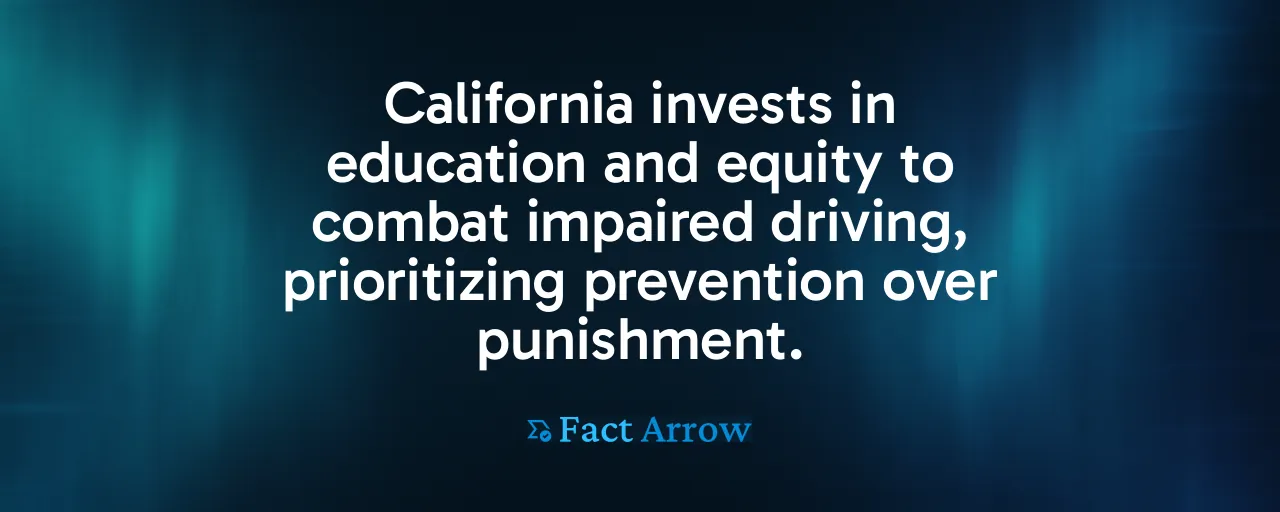A Bold Step Against Impaired Driving
California Governor Gavin Newsom announced a $35 million grant on July 9, 2025, targeting the persistent dangers of impaired driving. Distributed to nearly 150 local law enforcement agencies, nonprofits, and crime labs, the funds aim to tackle driving under the influence of alcohol, cannabis, or other drugs. The initiative, funded by cannabis tax revenue, aims to tackle impaired driving through enforcement, education, and community well-being.
This move signals a commitment to safer roads at a time when substance use, particularly cannabis, intersects with evolving social norms. Legal cannabis sales have surged since Proposition 64 passed in 2016, creating both opportunities and challenges. The grant reflects a proactive approach, aiming to save lives by emphasizing prevention and education alongside enforcement. This response to a complex issue demands a multifaceted strategy.
The plan arrives amid broader public safety efforts, including Newsom's $1.6 billion investment since 2019 to curb crime. This funding carves out a distinct path, blending prevention with fairness. By prioritizing training and outreach, the initiative acknowledges that lasting change requires addressing root causes.
Why Education Outshines Enforcement
At the heart of the grant is a push for public education campaigns that inform communities about the risks of impaired driving. Research from the National Highway Traffic Safety Administration shows that high-visibility awareness efforts reduce DUI incidents, especially when complementing enforcement. These campaigns work by shifting social norms, making it less acceptable to drive after consuming alcohol or cannabis.
Nonprofits receiving funds will lead localized outreach, tailoring messages to diverse communities. This approach differs from traditional policing, which often disproportionately impacts marginalized groups. Studies, including a 2020 report from the ACLU, highlight racial disparities in traffic stops, particularly for suspected drug impairment. By focusing on education, the grant seeks to prevent violations before they occur, reducing the need for biased enforcement.
The funding also supports Drug Recognition Evaluator training for officers, equipping them to identify impairment accurately. The primary focus, however, remains prevention. Public health messaging, paired with accessible information about safe alternatives like rideshare programs, offers a scalable solution that saves lives and promotes equitable enforcement.
Equity in Enforcement Matters
A critical concern in DUI enforcement is fairness. Data from the California Department of Justice shows that Black and Latino drivers face higher rates of traffic stops and arrests for suspected impairment, despite similar rates of substance use across racial groups. This disparity erodes trust in law enforcement and undermines safety goals. The grant tackles this by allocating funds to collect and publish demographic data on stops, ensuring transparency.
Advocates for criminal justice reform praise the focus on restorative approaches. Some funds will support programs for first-time offenders, offering education and treatment as alternatives to harsh penalties. Advocates argue that restorative approaches reduce recidivism, though independent evaluations of this claim are pending. This aligns with a broader push to treat substance use as a public health issue.
By investing in equitable practices, the grant challenges the status quo. It signals that safety and justice are intertwined, requiring solutions that uplift communities and promote unity.
Beyond Cannabis: A Holistic Approach
Though framed by cannabis legalization, the initiative addresses all forms of impaired driving. Alcohol remains the leading cause of fatal crashes in California, per CHP data, with polysubstance use, combining alcohol, cannabis, or prescription drugs, posing a growing threat. The grant's flexibility allows recipients to target these risks comprehensively, from upgrading toxicology labs to improving coroner data collection.
Historical context underscores the need for balance. After Proposition 64, early DUI grants focused heavily on enforcement. Crash rates did not drop significantly until education efforts expanded in 2020. This grant builds on that lesson, directing funds to sobriety-ride programs and rural transit options. A 2022 RAND study found that each dollar spent on such programs saves $3 in crash-related costs, proving their economic and social value.
The approach also recognizes cannabis's unique challenges. No reliable roadside test exists for THC impairment, unlike alcohol, complicating enforcement. By funding research into better testing, the grant paves the way for science-driven solutions that avoid arbitrary arrests.
Investing in Communities, Not Just Cops
A standout feature of the grant is its use of cannabis tax revenue to fund community-focused initiatives. In addition to law enforcement, funds support substance-use treatment and social services, addressing the root causes of impaired driving. This aligns with Proposition 64's original promise to reinvest cannabis revenue into public health and equity, complementing policing efforts.
Local governments and nonprofits will use the funds to expand access to treatment programs, particularly in underserved areas. A 2023 report from the California Health Policy Center noted that access to treatment reduces DUI rates by 10% in communities with robust programs. This approach differs from calls to funnel all revenue into enforcement, offering a model that prioritizes long-term prevention.
The grant also strengthens crime labs, reducing toxicology backlogs that delay justice. Upgraded equipment, funded since 2018, has already cut wait times in some counties by half, per a 2024 state audit. These investments ensure that safety measures are precise and effective, benefiting everyone on the road.
A Roadmap for Safer Roads
Newsom's $35 million grant marks a pivotal step toward safer California roads. By blending education, equitable enforcement, and community investment, it tackles impaired driving with nuance. The focus on prevention and fairness reflects a commitment to saving lives while addressing systemic inequities, setting a standard for other states to follow.
Challenges remain, including the need for better impairment testing and broader transit access. The grant's multifaceted approach, rooted in data and community needs, offers a promising path. Transparent metrics and independent evaluations will be key to ensuring the funds deliver measurable results over the next grant cycle.
As California navigates the complexities of legal cannabis and public safety, this initiative stands out for its balance. It proves that protecting communities can be achieved while upholding justice and compassion, offering a vision where everyone can travel safely and equitably.
